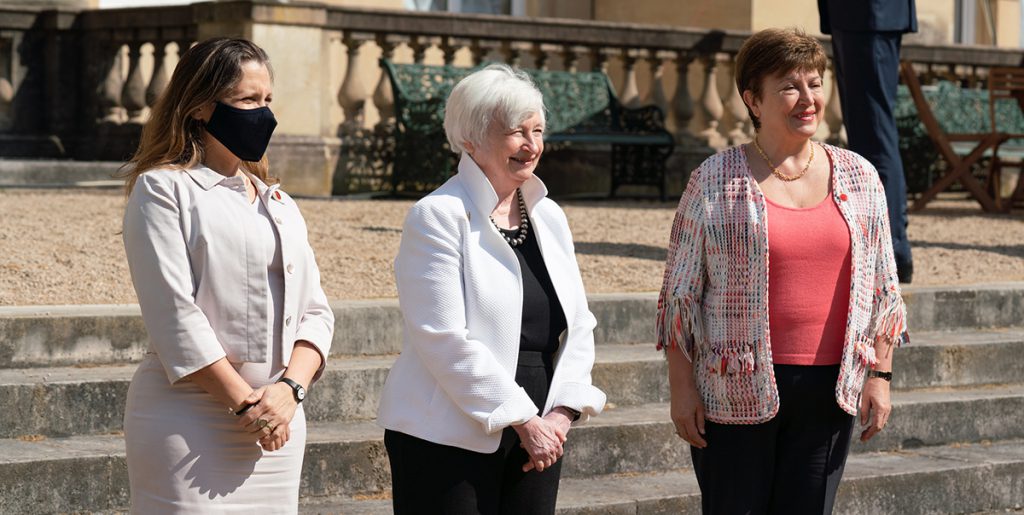The global minimum corporate tax will help countries retain wealth. Yet, writes Anna Guildea, a truly ‘global’ corporate tax must originate from sources more inclusive than the G7
On 5 June 2021, the G7 announced its support for a 15% global minimum corporate tax rate. This reform includes rules which provide that a country can tax corporate income where other countries do not exercise their ‘primary taxing rights’. In other words, if a country with a subsidiary of a multinational corporation (MNC) under-taxes it, the MNC's home country can receive the uncollected taxes. Alternatively, the subsidiary country can increase their tax rates, fully exercising their primary taxing rights.
The main motivation behind the agreement is to clamp down on profit-shifting: MNCs moving their profits to jurisdictions where they can avoid taxation. The advantage of this is that it removes the incentive for a country to maintain a low corporate tax rate.
the G7's global minimum corporate tax agreement may well benefit developed nations at the expense of those in the global South
This move would allow states to reassert power over corporations. It also represents a significant step forward after years of negotiations that had failed to reach consensus. However, one could argue that the agreement will benefit developed nations at the expense of those in the global South.
The G7’s agreement aligns with long-term EU aspirations to harmonise its tax policy and level the competitive field. Member states that regard low corporate tax as central to their economic growth had blocked previous attempts. Ireland stands out among such states. It is notorious for its 12.5% corporate tax rate that, in many instances, is estimated to be closer to zero.
With cases such as Ireland, there is a substantial argument that government subservience to MNCs has developed to a point that state tax policy serves corporate interests better than those of its citizens. Foreign Direct Investment (FDI) that enters a country for profit-shifting merely serves to inflate GDP. It passes through the state for no purpose other than to avoid taxation elsewhere. This doesn't leave much in the way of ‘real’ benefits to the economy or average person.
Ireland's state tax policy now serves corporate interests better than those of its citizens
Irrefutably, there is a need to for states to assert their sovereignty over corporations through taxation. Governments must block profit-shifting as a major mechanism contributing to disparity in global income. With the tax revenue collected, governments would be able to invest in public services. Blocking profit-shifting may even enable governments to lower the tax burden on the average citizen in times of economic crisis.
In broader historical terms, however, we can't dismiss the role of corporate tax policy and attraction of FDI in Ireland’s long-term growth. Ireland was very much a developing country until the 1970s. Much of its ‘growth’ today is the result of GDP distortion by profit-shifting. Yet when this tax policy was first implemented, much genuine expansion occurred that transformed the country’s labour force.

In a contemporary context, Ireland has developed claims to competitiveness beyond low tax rates. It is politically stable, with strong institutions, developed infrastructure, education and skilled labour. All this has allowed Ireland to specialise in high value-added niches in global value chains. In many ways, this is attributable to policies of low corporate taxation adopted in the twentieth century.
If anything, the Irish growth model from the 1960s onwards presents evidence that attracting FDI through low corporate taxation can be a ticket to development.
We can extend this line of thinking to the global South. Like Ireland, many countries in the South had been colonised, deindustrialised, and, on gaining independence, left with structurally deformed economies. A global minimum corporate tax rate prevents these countries developing specialisms in higher value-added sections of global value chains.
Several developing countries have lower than average corporate tax rates, notably in Central and South East Asia. Many African and Latin American countries, meanwhile, have high statutory tax rates – but offer other incentives for FDI.
Unlike low-tax jurisdictions in the global North, these countries lack alternative claims to competitiveness. In many ways this stems directly from the actions of the global North: colonialism, structural adjustment programmes, political instability arising from Western ‘intervention’. Economies in the global South should therefore be granted a leg-up in competitiveness wherever possible.
Can we achieve global consensus on what is right when it comes to taxation? Surely, the decision cannot be truly ‘global’ if it is made by the world’s seven wealthiest countries. As we have seen, achieving ‘justice’ in taxation means different things in different contexts of development.
On the one hand, a global minimum tax would allow governments to reassert sovereignty over companies and convert previously untaxed profits into public spending. The Biden administration called it a ‘foreign policy for the middle class’. When our unit of analysis is the developed economies that are home to MNCs, the agreement would, undeniably, benefit the average citizen in these states.
global consensus on taxation cannot be truly ‘global’ if the decision is made by the world’s wealthiest countries
On the other hand, the vast majority of MNCs are located in the global North. A minimum tax could therefore retain wealth in those countries, and prevent developing economies enticing much-needed FDI.

US Secretary of the Treasury Janet Yellen praised the agreement. She claimed it will ‘encourage countries to compete on a positive basis, such as educating and training our work forces and investing in research and development infrastructure’. Her statement implies the G7 agreement would categorically level the playing field, making this equally possible for all countries.
The need for governments to rein in corporate power is undeniable. However, to reach a truly ‘global’ consensus, negotiations must take place in fora more inclusive than the G7. Such negotiations should also cater for divergence in economic development, accounting for the unfair competitive advantages of the global North, and granting special, differential treatment to less developed economies.